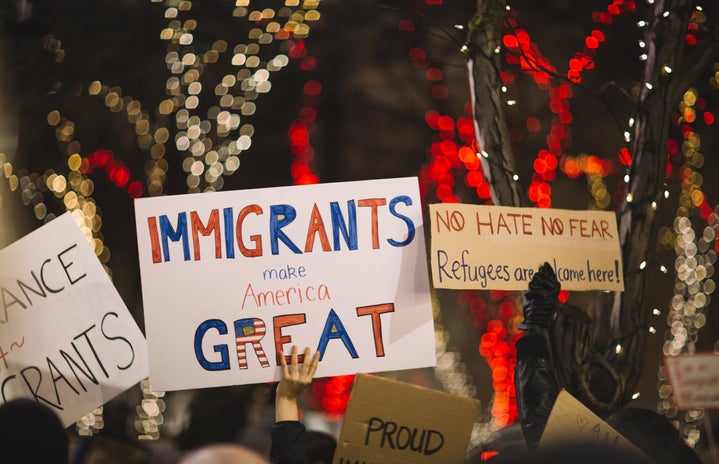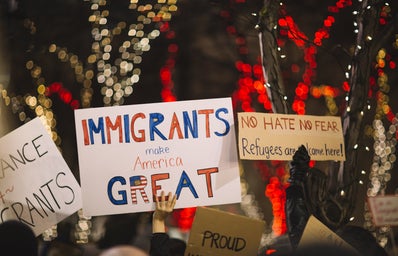I can guarantee that you know someone who is not a United States citizen. Some of them may be undocumented, but others have several different types of legal statuses. These are people who you have grown up with, gone to school with, been friends with and loved. With the current political administration, immigrants are in more danger of being deported than ever before. DACA is coming to a close, DREAMers are losing hope and TPS is ending for hundreds of thousands of people. They have lived in the United States for years — worked here, paid taxes, obeyed the law, grown families built their livelihoods here — and now they may be forced back into a foreign land that they have no relationship with. It may be difficult to make sense of all of this if you are not being personally affected. However, it is crucial that we, the citizens and permanent residents of the United States, fully understand what bullshit this all is.
What is DACA?
In September 2017, Trump called an end to The Deferred Action for Childhood Arrivals (DACA). This program allowed participants who came to the United States as children to live and work here legally. This was important because for most of the recipients, the United States is the only country they truly know. They did not make the decision to come here when they were children. None of this is their fault. But now, they are left with no options since the Trump administration has decided to end DACA. Thousands of people who have lived here their whole lives will be deported to a country they have hardly ever known, with no other choice. Most would identify as US citizens, rather than citizens of the country where they were born.
Who are DREAMers?
The Development, Relief, and Education for Alien Minors (DREAM) was an act created to give people who came to the US as children a path to citizenship, as the next step of DACA and TPS. This act was never fully passed, but subsequent bills are continually being proposed to this day. The people who would have been recipients refer to themselves as the DREAMers. This term is more of a description, rather than a status. Many DACA and TPS recipients use this term to help better articulate their thoughts and opinions. They receive no federal aid because they have never been given a pathway to citizenship.
Related: What It’s Like Being a POC at Mason
What is TPS?
Temporary Protected Status (TPS) is a way for immigrants from countries with war, violence and natural disasters to receive temporary legal status in the United States. This allows the recipients to live and work legally in the United States. Many have been in the US for almost two decades, and yet there is no path to citizenship from having TPS. Some countries that are currently under TPS are El Salvador, Honduras, Somalia and Nepal. Many of these recipients have built their lives here, having come into the country on a visa and then switching over to TPS.
In November 2017, Nicaragua, Haiti, and other countries were denied renewal for their TPS from the Department of Homeland Security, while Honduras was given only a 6-month extension. About 200,000 Salvadorans will find out about whether or not their TPS will be extended by Jan. 8, 2018. These recipients have spent their whole lives unsure of if they will have to return to these counties that are unsafe and may bring them unemployment, civil unrest or even worse: a death sentence.
How To Become a Citizen
As of right now, there are only a few ways to obtain a green card in order to become a permanent resident and ultimately, a United States citizen. You can marry a citizen, be sponsored by your employer or be sponsored by a family member who is already a citizen. These steps and pathways can also vary depending on that person’s legal status and country which they are coming from. Each of these options have multiple long, expensive and complicated steps that must be completed. Even with marriage, which is the fastest way to obtain citizenship, it can take up to five years after you are married to gain citizenship For many of the DACA and TPS recipients, there is no clear path to citizenship.
What You Can Do
So, what can we, the citizens and permanent residents of the United States do? If you are a citizen, VOTE. Electing officials who understand immigration can help change our legislation if we ever want this broken system to change. Even local politicians can make a difference. You can contact your local politicians and voice your opinion by texting “RESIST” to 50409. Use your privilege and speak for those who can not. Even just helping to educate your friends and family can make a difference. Try watching and sharing this video from Buzzfeed that is not only funny but actually paints an accurate portrayal of what it is like to try and immigrate into the United States and helps make a complicated topic understandable. You can also become involved with Mason Dreamers here at GMU if you are interested in learning more and making a difference.
America was founded by immigrants, and unless you’re a Native American, you’re an immigrant, too. Stop trying to kick them out.



